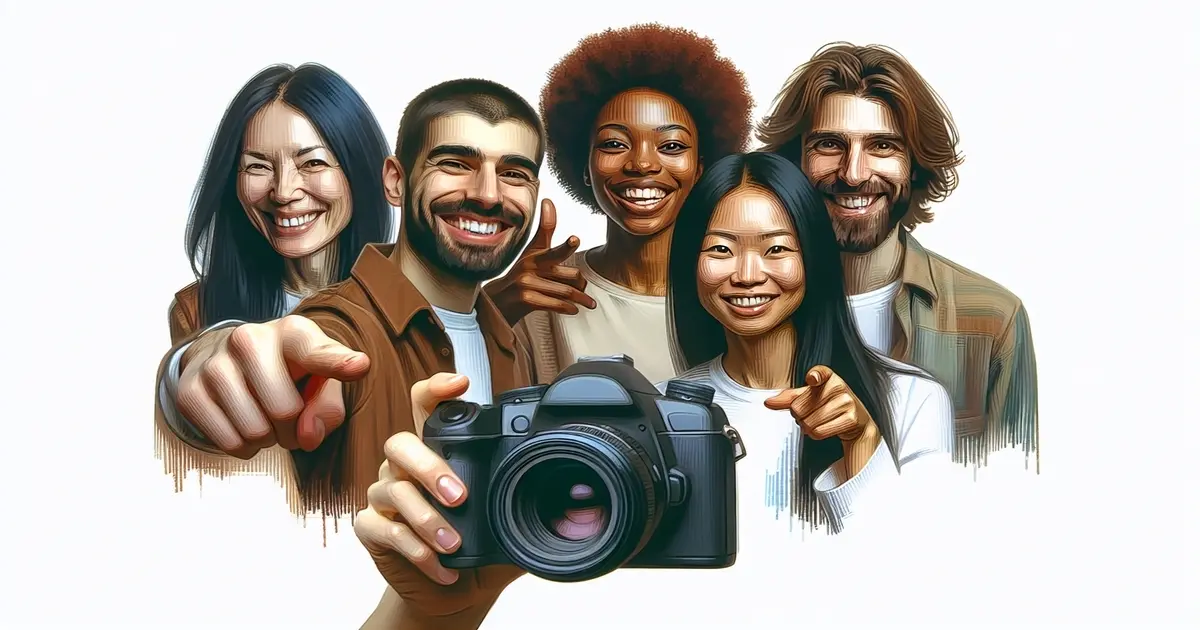Always Smile: Types and Their Meanings
Explore the meanings behind different types of smiles and discover why always smiling can have powerful benefits.

Always smiling creates a positive vibe from when you wake up to when you go to bed. Keep doing this, especially when the going gets rough!
In most cultures, a smile is the best way to open communication. It elicits spontaneous conversations with non-friends, from small American towns in the Midwest to the bustling streets of New York City. It's often cited that smiles make people more comfortable, more trusting, and more open to productive conversations.
In the U.S., you can find smiles in local coffee shops, family-owned offices, and even on the running trails of your local park. Whether helping to brighten someone's day or comforting them during a tense moment, smiling makes life a little more pleasant.
In this post, we want to showcase the power of those small acts. They can influence connections, offer comfort during crises, and add vibrancy to our everyday lives.
" Always smiling creates a positive vibe from when you wake up to when you go to bed. "
Key Takeaways
- Smiling naturally releases endorphins and other feel-good chemicals into your brain. This immediately raises your happiness and improves your ability to cope with stress.
- A genuine smile is one of the best ways to appear more welcoming and trustworthy. It leads to deeper friendships, better relationships, and more promising first impressions.
- Get into the practice of smiling every day! It can also improve your health in other ways—by reducing your stress levels, helping your immune system, and improving your overall sense of well-being.
- Little daily victories add up to big wins over time. They create a permanent smile ripple effect that improves your day and everyone around you.
- Smiling remains a universal language across America, breaking down barriers and building connections in diverse communities from coast to coast.
- Even on those hardest of days, there are always reasons to smile. However small, these moments help foster resilience and root you in hope and optimism.

What Happens When You Smile?
Your smile is much more than just a charming facial expression. Smiling is infectious in Marrakech, where life bursts with sodden colors and cheerful bonjours. Each smile sets off an incredible chain reaction of positives in your body and brain. It affects your mood and the way others see you. This tiny gesture creates a domino effect, beginning in the brain and radiating out.
Your Brain on Happiness
Smiling forces the brain to produce these endorphins and neuropeptides, which reduce stress levels. When you smile, brain regions associated with feelings of happiness activate. Dopamine and serotonin surge, and your reward system activates, resulting in a feel-good.
This feedback loop, which can make a fake smile feel like a genuine mood enhancer, allows anyone to be a little more positive. Long-term, maintaining the practice of smiling can have mental health benefits. Research has even found that frequent and authentic smiling can lead to a longer life and a lower risk of depression.
The Instant Mood Lift
All it takes is an instant mood lift. Smiling can help turn around an otherwise horrible day. Even if it's the most fake smile in the world, smiling makes your brain think that you're lightening up.
Cortisol, the primary stress hormone, decreases, and with it, tension and anxiety. In those moments of stress, whether waiting to hear back from something or facing a hostile audience, smiling makes the atmosphere easier to bear. The research shows that smiling through pain works! Smiling while getting a shot from the doctor can reduce the pain by 50%.
How Others See Your Smile
A smile radiates goodwill, friendliness, and openness. In Morocco, where social connections are highly valued, smiling individuals are viewed as more approachable and honest.
A genuine smile goes a long way in turning first impressions to your advantage, from the coffee shop to the boardroom. It creates connections, facilitates new friendships, and promotes collaboration among teammates. Smiling, at its core, is a globally friendly face gesture.
Why Smiling Matters Every Day
As easy as a smile might seem, its power is anything but basic. The simple act of smiling influences our mood, our impression, and the health of our cardiovascular system. In Marrakech, smiles greet neighbors in the medina, ease business in the souks, and light up small moments over mint tea.
Though "smiley" faces in online conversations mimic this movement, the authentic version offers much more than a warm welcome. That's the power of making smiling a daily habit! You'll be surprised at how easy it is to make yourself feel better—and you might even change the mood of the whole room.
1. Boost Your Spirits Naturally
Smiling makes you happier, by yourself! It's not magic, it's biology, and it happens every time you smile. Smiling causes your brain to release endorphins and serotonin, natural pain killers and mood boosters. This is fine when you're smiling at your buddy's ridiculous joke in Jemaa el-Fnaa.
It applies when you smile slightly while walking through the city's parks and arboretum. No external incentive required—your facial expressions communicate with your central nervous system, and the emotion comes after.
Creating the practice of smiling doesn't require inauthentic happiness. Start by noticing small things—a fresh orange juice, the sound of birds at dawn, the bright colors in a rug shop. Allow that smile to appear and stay just a little longer.
Over time, this seemingly minor gesture can change how you feel. It can even alter your mindset, helping you more easily overcome negativity. You start to feel empowered to take control of your mood. That faith creates self-assurance, day by day.
2. Ease Stress in Moments
Stress comes at us from all angles—a difficult morning rush, an awkward exchange at the office, or conflicts with relatives. Smiling is an instant anxiety antidote. When you smile, your heart rate decreases, and your body produces stress hormones. That's your body's signal that it's safe to let your guard down.
Here are some moments when smiling can help:
- Waiting in a slow-moving line at the market
- Dealing with a last-minute work deadline
- Navigating a disagreement with a loved one
- Facing a setback or mistake
In every example, a smile is not a solution to the issue at hand. It communicates to your body and mind that you control the situation. That sense of peace allows you to respond more thoughtfully and with greater patience.
3. Seem More Open and Friendly
Each smile acts as an open door, welcoming the other person in. People in Marrakech know this: a quick smile at a stranger can lead to a warm greeting or even spark a new friendship over tea. Smiling helps you appear more friendly and inviting, improving social experiences with family, coworkers, or strangers.
Finally, when you first meet someone new, a smile goes a long way in establishing trust. It's more natural to begin a conversation, exchange thoughts, or collaborate. That's important in the workplace, the community, and even when interacting with tourists on the city's famous narrow-streeted, old downtown.
On a more practical level, smiles open doors and create a sense of belonging for all, regardless of country of origin or native tongue.
4. Support Your Body's Defenses
In other words, smiling improves not only how you feel but also how you heal. Healthcare providers have known for a long time that smiling makes people healthier. Smiling and laughter decrease inflammation, improve your body's ability to fend off illness, and even extend your lifespan.
One study showed that laughter therapy reduced the need for heart medication, demonstrating tangible, physical benefits. Positive emotions boost your health in myriad other ways, as well. Smiling has been connected to reduced levels of anxiety and faster recovery from illness.
Joy—expressed most vibrantly through laughter—fits this category. So, that fleeting smile or mutual guffaw in a Marrakech teahouse isn't just enjoyable. It's just plain good medicine.
5. Build Stronger Connections
Shared smiles create social bonds. In communities, smiles brighten public spaces. Among friends, they celebrate shared humor or cherished experiences. Even on the job, a simple smile can diffuse an angry meeting or increase collaboration within a team.
First, smiling helps build empathy and understanding by letting others know you are open to hearing them. It's a small and simple sign of understanding, but it goes a long way. We become unforgettable.
Smiling helps people remember those who greet them with a smile, and those memories go a long way in maintaining strong bonds. Whether in bustling markets or peaceful courtyards, these interactions are meaningful.
6. Make the World a Bit Brighter
A smile is as contagious as they say. After all, one person's smile can be infectious enough to uplift an entire crowd. This "contagious effect" or "ripple effect" means your smile can brighten the day of those around you, including strangers.
Smiling is usually a precursor to other minor acts of kindness—opening a door, providing assistance, or simply sharing a joyful moment. Communities that value smiling are friendlier and more inviting.
In Marrakech, friendly smiles go a long way in closing the divide between tourists and residents, creating a much friendlier atmosphere throughout the city. In time, these brief exchanges become a cumulative effect, brightening the world for everyone.
7. Look and Feel Your Best
A smile is the most beautiful cosmetic a woman can wear. It lights up your eyes, relaxes your face, and gives you a radiance that no cosmetic or camera filter ever can. Smiling can help you look younger!
When you're confident in your smile, you sit up straighter and walk with a little more swagger. That boost in confidence unlocks opportunities, whether in employment or everyday interactions.
Humans are more inclined to return a smile with trust and friendliness. This can go a long way in affecting how people perceive you. It can even open up new opportunities, such as receiving a job offer or an invitation to participate in a study.
8. Increase Your Overall Positivity
Smiling is why you'll get good news, not just because you heard some, but because you made a habit of creating a positive outlook. Each time you smile, you're conditioning your brain to take notice of the positive.
Once adopted, this habit gives you the resilience to address issues as they arise. The more often you smile, the more ways you'll find to appreciate the little victories and be happy with your day-to-day.
This goes a long way in Marrakech, where daily life is often hurried and complicated. Consider making a habit of beginning and concluding your day with a smile, and watch how your perspective changes along with it.

Smiling: Our Shared Human Language
Yet smiling is a powerful, universal human gesture that acts as an essential bridge across cultures and languages. Wherever you travel, a smile communicates the same thing—goodwill and friendliness. Research has even found that infants as young as six months can recognize a smile, regardless of their cultural upbringing. That speaks volumes about how fundamental smiling is to all of us.
While smiles can mean different things in different places, the main idea is that they help people connect.
A Universal Sign of Welcome
Walk into virtually any coffee shop in New Orleans or bakery in rural Maine! As you enter, you'll first be struck by the welcoming smile that awaits you. In hospitality, a warm smile is just the beginning. It's not about being polite; it's about hospitality and making other people feel like they've come home.
Anyone who's ever worked in hospitality—from the hotel concierge to the restaurant staff to the shopkeepers—understands that a big, friendly smile can speak volumes when words fail. A genuine smile—the kind that reaches the eyes—invites genuine welcome, helping to break the ice and soothe people into unfamiliar territory.
Warming Up Everyday Encounters
Just one smile has the potential to turn around an entire day. A genuine smile can make an uncomfortable encounter less so, whether at the supermarket or while waiting for the bus. When tempers flare, a simple smile can thaw the air and let people get past the coldness.
It's a valuable little magic for everyday encounters—smile at someone, and they'll probably smile back. This cycle of goodwill goes a long way to making the common day-to-day more pleasant.
Smiles Across America
Smiling is as American as apple pie on every corner of the United States. State-level initiatives in other states, like Texas or Minnesota, provide a friendly smile. In comparison, larger metropolitan areas may hide their smiles behind a bigger, toothier grimace.
Smiles are essential for connection, whether at a parade, sporting event, or family reunion. Through media and movies produced here in the U.S., we have introduced the impact a smile can make, sharing its worth across the globe.
Find Your Daily Dose of Joy
Identifying and cultivating those moments of happiness creates the foundation for long-term fulfillment. In Marrakech, joy often appears in simple moments: a neighbor's warm hello, the sweet smell of mint tea, or sunlight bouncing off red city walls.
These little moments of joy are important. It's true—smiling, like the photographer's code "say cheese" since 1943, transforms an ordinary occasion into an experience you'll never forget. So make sure that when you smile, you brighten your day and everyone else's.
Research has found that frequent smokers live longer by as much as seven years. These small joys accumulate. Be thankful for the small things, such as when you first sip coffee or feel a cool breeze.
Needless to say, it makes you feel good! Mindfulness is key to this practice. When you take the time to appreciate these little joys, you have more and more things to be happy about. Recording a gratitude list is a straightforward way to emphasize the good.
It adds up even if you only write a note or two daily!
Here are a few ways to find daily joy in Marrakech or anywhere:
- Enjoy a sidewalk pastry shop treat or a glass of freshly squeezed juice
- Share a joke or a story with a friend
- Take in a sunset from your rooftop
- Listen to local music or the call to prayer
- Walk through the medina, noticing colors and scents
Quick Quotes for a Fast Grin
- "A smile is the shortest distance between two people."
- "Say cheese and watch the world smile back."
- If you're still unconvinced, here's the final one: "Laughter is the sun that drives winter from the human face."
After all, humor connects us all, regardless of where we come from. Words make a difference. It only takes one quick quote to put a smile on someone's face, but sharing that quote multiplies the happiness!
Comedy is another significant ingredient. It transcends cultures, lifts spirits, and enhances the quality of everyday life.
Uplifting Words on Happiness
Positive affirmations, such as "I am thankful for today," go a long way toward creating a joyful mood. Having uplifting words on your walls or phone will help remind you to stay focused on the positive, even when bad days come.
The right words—whether they're read or listened to—when repeated, can help make it much easier to stay optimistic.
Messages to Brighten Your Day
- "You've got this."
- "Today has something good in store for you."
- "Your smile is your best feature."
You learn to bounce back even faster when you begin each day with positive messages. Passing these on to your friends, family, and community members builds that supportive ripple effect and maintains the spirit of joy in your community.

Simple Tricks to Smile More
Though it seems easy, smiling usually requires practice and know-how to incorporate into everyday life. In Marrakech, where morning air hums with calls to prayer and cafes fill with the scent of mint tea, finding simple ways to smile can make even the busiest days brighter. Little tweaks can take a pretty good day and make it more smile-worthy. These shifts are based on default and deliberate choice.
Start Mornings with a Grin
Mornings in Marrakech begin with leisurely half-spheres of orange splashed across terracotta rooftops. Smiling when looking at yourself as you wash your face might be a minor gesture, but it gets you to a place where smiling feels as comfortable as putting on an old, warm scarf.
Keeping a notebook on your bedside table to jot down things that make you grin—like the neighbor's rooster or the promise of fresh msemen—can set a positive tone. Try to wake up with a 60-second appreciation scan before you eat. Or, play a song you love to help put a smile on your face!
Try Mindful Smiling Breaks
The cacophony of the medina may start to feel like too much. Smiling mindfully can help. Taking a few minutes to smile softly and sincerely, along with deep, conscious, slow breaths, centers you.
Mindful smiling relaxes the facial muscles, relieving tension and stress. It resembles the facial feedback expressions in the Facial Action Coding System (FACS). Give it a shot—put a pencil between your lips for a few seconds, then ease your mouth and allow a smile to take shape. It's a simple trick, but it's effective.
Seek Out Happy People & Places
Our environment directly influences our mood. While Marrakech's crowded souks and vibrant gardens are a busy traveler's paradise, they're an excellent opportunity to encounter friendly smiles. Consider which places or people consistently make you smile.
Perhaps it's the warm greeting from your Moroccan vendor in Jemaa el-Fnaa or a longtime pal at your local coffee shop! Whether you spend time in their presence, listen to their stories, or exchange humor with them, uplifting music and your favorite hot spots put you in a better mood and reinforce the habit of smiling.
- Favorite café with friends
- Rooftop gardens at sunset
- Family gatherings with laughter
- The local hammam after a long day
Can Faking a Smile Help?
Research has found that even a faked smile—what FACS would describe as an introduced facial action—can improve your mood. According to Paul Ekman's research, faking a smile can make you feel happy for real after a while.
It's not brain magic, but over time, the brain begins associating the physical behavior of smiling with feelings of happiness. After a while, these "fake it till you make it" instances turn into reality. The key is to repeat it, even when it feels silly, and allow your facial muscles to become accustomed to the process.
Smiling When Life Gets Tough
Smiling when life gets tough is more than a happy face. It cultivates resilience and aids individuals in discovering optimism even in moments when existence seems burdensome. In Marrakech, the fabric of everyday life brings family, friends, and neighbors close together. A smile is a powerful thread helping to hold these connections in place.
It can bring joy to moments of suffering and improve a terrible day. The late Thich Nhat Hanh, the kind and soft-spoken Buddhist monk, taught that a smile can relieve suffering and alter an entire day. Even in the depths of despair, a genuine smile can give a person the strength to face the next dawn.
A smile is a human being's universal expression of happiness. This makes it a great connective tissue in social relations, transcending language and culture. In the twisty alleyways of Marrakech, it's not unusual for strangers to recognize each other with a smile, creating a series of tiny yet intimate impressions.
According to science, smiling tells your brain to release endorphins, which help reduce pain and increase happiness. Serena Williams knows that sometimes, you need a smile to get you through the most challenging times. At the same time, Yoko Ono reminds us that a smile in the morning makes for a hopeful day.
An authentic smile, even a fleeting one, can change how people view themselves and each other. As playwright and screenwriter Robert Harling says, "You can't keep a smile off a face." Even when life gets tough, each smile can multiply, setting off a chain reaction of positivity among any group, home, work, or play.
Laughter and smiles are special medicine—easy, free, and ready whenever needed.

The Underrated Power of a Smile
A smile has a unique approach to becoming integral to everyday life. You really can't get a sense of that crunch here in Marrakech. Beyond a quick flash of pearly whites or upturned mouth corners, it's deeper than that.
Nothing brightens a room or a bustling street like a smile, whether guarded, tentative, or a broad, easy grin. In the medina, I've watched locals and visitors to Essaouira exchange smiles. Words can fail, but a smile always hits the spot—no translation required.
It's a tiny gesture that can center someone and remove their stress. Many people report that smiling makes them feel more in control—it's almost as if they can control their mood for the rest of the day!
There's real science behind it, too. Research finds that even the mere act of smiling can increase feelings of happiness and improve overall wellness. Those proud owners of smile lines or cheek dimples—markers of good fortune in most cultures—sport these markings like a badge of joy.
Dimples on either or both cheeks make a smile even more attractive, and their appeal goes beyond the popular media to the nerdy world of medical research. A smile's ripple effect goes beyond just making you feel good because it's the beginning of a ripple effect!
The simple act of one person smiling at another sends a spark out, illuminating an entire audience in a bustling souk or café. A smile is one of the easiest gifts, transcending cultures and colors and forging connections when language fails.
Smiling's legacy is profound. It creates a sense of place and nostalgia. It cultivates community and togetherness. It helps the world to be a little more welcoming and friendly, one smile at a time.
Related Tips
Conclusion
Always having a smile on your face is like an immediate boost. Smiles break the ice, spark small talk, and help folks bond, even with strangers on hot Marrakech streets or in a busy café. In that way, smiling acts as a reset, suddenly making a bad day better, making your sad friend smile, and usually bringing out all the best things. Even at the most challenging moments, a smile will get you through. We all know that some days are more difficult than others, café a genuine smile still creates a world of possibilities. Try it out at the farmers market, with a friend or family member, or in your kitchen. Watch everyone's faces brighten and see how your own heart glows. Smiles may not be expensive, but they are effective. So go on, keep making 'em smile and see your community change for the better.








